Looking for a Personalized Diet Plan?
Maggi Calories, Nutrition Facts & Health Benefits

By Asfia Fatima, Chief Dietitian at Clearcals
TL;DR
- There are 285 Calories in one medium cup of Maggi.
- Calories in Maggi depend on the serving size and recipe.
- It is an instant food high in sodium, saturated fat, and refined carbs.
- Eat it in moderation and less frequently.
- Patients with chronic conditions should avoid eating Maggi.
How Many Calories Are In Maggi Noodles?
There are 285 kcals in one medium cup of Maggi. The calories in Maggi depend on its recipe, serving size, or quantity in grams.
Here is a table of how calories increase with quantity.
| Quantity (in grams) | Maggi Calories (kcal) |
|---|---|
| Small cup (100 grams) | 142 |
| Medium cup (200 grams) | 285 |
| Large cup (300 grams) | 427 |
Maggi Nutrition
Maggi is an instant food high in sodium. It contains 59% (168 kcal) carbohydrates, 8% (23 kcal) protein, and 33% (94 kcal) fat. Eat it in moderation as it is high in simple starches, saturated fat, and sodium.
Download the Hint app to track your calories and nutrients for Maggi. Also, using the Hint app, you can check out the recipe ingredients and instructions for Maagi, which has 285 kcal per medium cup.
Watch: How to Track Maggi Calories on the Hint App
Maggi Protein
One medium cup of Maggi contains 5.3 grams (23 kcal) of protein, which is just 8% of its total calories. This low protein content makes it unsuitable for those aiming to build or maintain muscle mass.
For higher protein intake, use the Hint app to find balanced, protein-rich meals that fit your dietary goals.

Maggi Benefits
The primary benefit of Maggi is its convenience. It’s easy to prepare and can satisfy hunger quickly.
However, from a nutritional standpoint, it lacks essential nutrients like fiber, protein, vitamins, and minerals, making it a less healthy option when consumed frequently.
Is Maggi Good for Health?
Maggi, while convenient, is not the healthiest option due to its high sodium content, refined carbohydrates, and lack of essential nutrients like fiber and protein. Although it can be enjoyed occasionally, relying on it as a regular meal can negatively impact your health.
For healthier meal alternatives and personalized diet plans, use the Hint app to find nutritious, well-balanced recipes.
Is Maggi Bad for Health?
Yes, Maggi can be bad for your health if consumed frequently or in large amounts due to several factors:
- High Sodium Content: Maggi contains a high amount of sodium, which can increase the risk of high blood pressure, heart disease, and kidney problems when eaten regularly.
- Refined Carbohydrates: The noodles are made from maida (refined flour), which lacks fiber and essential nutrients. Consuming too many refined carbs can lead to weight gain, insulin resistance, and other metabolic issues.
- Saturated Fat: Maggi contains saturated fats, which, when consumed in excess, can raise cholesterol levels and increase the risk of cardiovascular diseases.
- Low Nutritional Value: Maggi lacks essential nutrients like fiber, vitamins, and minerals. It provides mostly empty calories, which can lead to nutrient deficiencies if consumed as a staple in your diet.
- Preservatives and Additives: Maggi contains artificial flavors, preservatives, and additives, which, while safe in moderation, may have negative health effects when consumed frequently.
Is Maggi Good for Weight Loss?
Maggi is not a good option for weight loss due to its high content of carbs and fats, with minimal protein. It is also low in fiber, which means it doesn’t help with satiety, potentially leading to overeating.
For effective weight loss, consider more nutritious alternatives and consult a dietitian through Hint Premium, where you can receive a personalized weight loss plan tailored to your needs.
Does Maggi Increase Belly Fat?
Due to its high content of simple carbs, refined starches, and saturated fats, frequent consumption of Maggi can contribute to weight gain, especially in the abdominal area. Processed foods like Maggi can lead to higher calorie intake without providing adequate nutrients, leading to fat accumulation.
For healthier meal options and tracking, download the Hint app to keep tabs on your daily caloric intake.
Is Maggi Good in Pregnancy?
Maggi is not the most nutritious choice during pregnancy, as it lacks essential vitamins, minerals, and protein. Additionally, its high sodium content could increase blood pressure, which is something to be cautious about during pregnancy.
We recommend more nutrient-dense, balanced meals during pregnancy, which you can explore in the Hint app.
Is Maggi Harmful to Health?
While eating Maggi occasionally is not harmful, regular consumption could lead to health issues due to its high sodium, saturated fat, and refined carbohydrate content. Overconsumption may increase the risk of high blood pressure, cardiovascular problems, and weight gain.
For guidance on managing your diet for better health, consult a dietitian through Hint Premium.
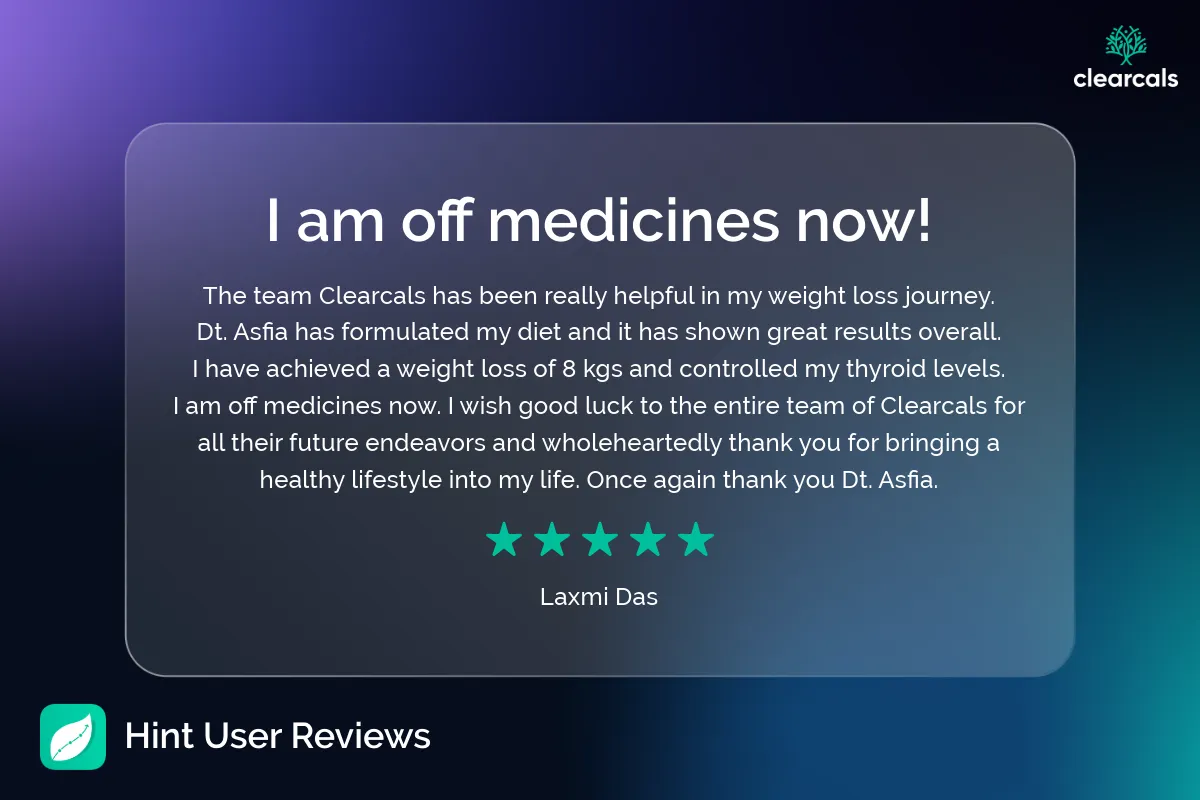
Is Maggi Good for Diabetes?
Maggi is not an ideal choice for individuals with diabetes due to its high content of refined carbs and fats, which can spike blood sugar levels and have long-term effects on insulin sensitivity.
If you’re managing diabetes, it’s better to opt for low-glycemic, fiber-rich meals.
You can explore diabetic-friendly recipes in the Hint app and receive a tailored meal plan with Hint Premium.
Is Maggi Good for Blood Pressure?
Maggi is high in sodium and low in essential nutrients like fiber and protein, making it a poor choice for individuals with high blood pressure. High sodium intake can increase blood pressure and exacerbate hypertension.
Patients with blood pressure concerns should avoid or limit their intake of Maggi and focus on low-sodium, nutrient-rich meals available through the Hint app.
Is Maggi Good for PCOS?
Maggi is not a suitable food for those managing PCOS. The refined carbs and lack of fiber can increase insulin resistance, a common issue in women with PCOS.
For those with PCOS, it’s essential to focus on whole foods rich in fiber, lean protein, and healthy fats.
The Hint app provides personalized meal plans designed to manage PCOS symptoms.
Is Maggi Good for the Thyroid?
Maggi contains simple carbohydrates, which are not ideal for individuals with hypothyroidism.
Hypothyroid patients are encouraged to follow a moderate to low-carb diet to manage their weight and thyroid function. Instead of processed foods like Maggi, opt for nutrient-dense meals.
The Hint app offers thyroid-friendly recipes that can help support thyroid health.
Is Maggi Good for Immunity?
Maggi lacks essential vitamins and minerals needed for a strong immune system.
Regular consumption of processed foods can impair immune function, especially when they’re low in nutrients and high in sodium, fats, and refined carbs.
To boost immunity, focus on a diet rich in vitamins, minerals, and antioxidants.
The Hint app has a variety of immune-boosting recipes to support your overall health.
Is Maggi Good for Muscle Gain?
Maggi provides minimal protein, which is critical for muscle growth.
While it contains carbohydrates for energy, its lack of protein and high content of unhealthy fats make it a poor choice for muscle gain. To support muscle growth, prioritize meals rich in lean protein and complex carbohydrates.
The Hint app features protein-rich recipes designed to complement strength training and muscle development.
Is Maggi Good for Weight Gain?
Maggi’s calorie-dense nature makes it a possible contributor to weight gain if eaten frequently.
However, for healthy weight gain, we recommend focusing on protein-rich, nutrient-dense foods combined with regular physical activity.
You can find balanced meal plans for weight gain in the Hint app or consult a dietitian via Hint Premium for personalized advice.
Other Noodle Varieties
There are a wide variety of noodles. Here are the calorie values of various noodles (for a medium cup). Download the Hint app for information on noodle recipes, calories, and nutrition facts.
| Noodles varieties | Calories(kcal) in 1 medium Cup (200 grams) |
|---|---|
| Knorr soupy noodles | 207 |
| Sunfeast yippee noodles | 311 |
| Prawns noodles | 365 |
| Fish noodles | 380 |
| Vegetable noodles | 381 |
| Mixed Hakka noodles | 390 |
| Egg noodles | 390 |
| Chicken noodles | 400 |
| Chicken Manchurian noodles | 495 |

1. Yippee noodles
One medium cup of Yippee noodles has 311 kcal. It contains 54% carbohydrates, 8% protein, and 38% fat. Sunfeast Yippee noodles are instant food high in refined carbohydrates. Eat it in moderation as it is high in refined carbs and saturated fat.
The calories in Yippee noodles depend on their serving size or quantity in grams. Here is a table of how calories increase with quantity.
| Quantity (In Grams) | Yippee noodles Calories (kcal) |
|---|---|
| 1 Small cup (100 grams) | 156 |
| 1 Medium cup (200 grams) | 311 |
| 1 Large cup (300 grams) | 466 |
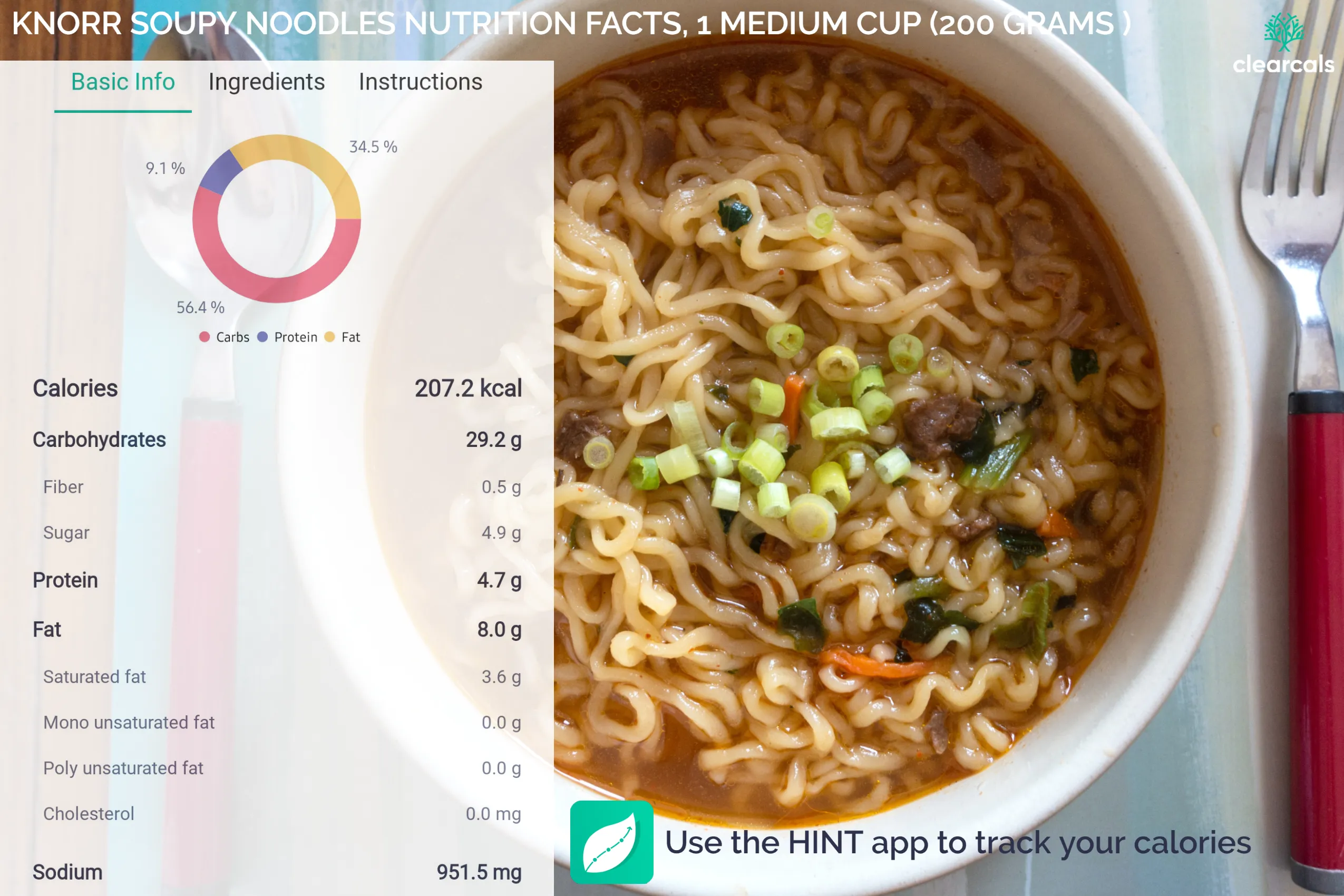
2. Knorr soupy noodles
One medium cup of Knorr soupy noodles has 207 kcal. It contains 57% carbohydrates, 9% protein, and 34% fat. Knorr soupy noodles contain high sodium, added flavors, preservatives, and added sugars, making them unhealthy. Excessive consumption may lead to various metabolic disorders.
The calories in Knorr soupy noodles depend on their serving size or quantity in grams. Here is a table of how calories increase with quantity.
| Quantity (In Grams) | Knorr soupy noodles Calories (kcal) |
|---|---|
| 1 Small cup (100 grams) | 104 |
| 1 Medium cup (200 grams) | 207 |
| 1 Large cup (300 grams) | 311 |
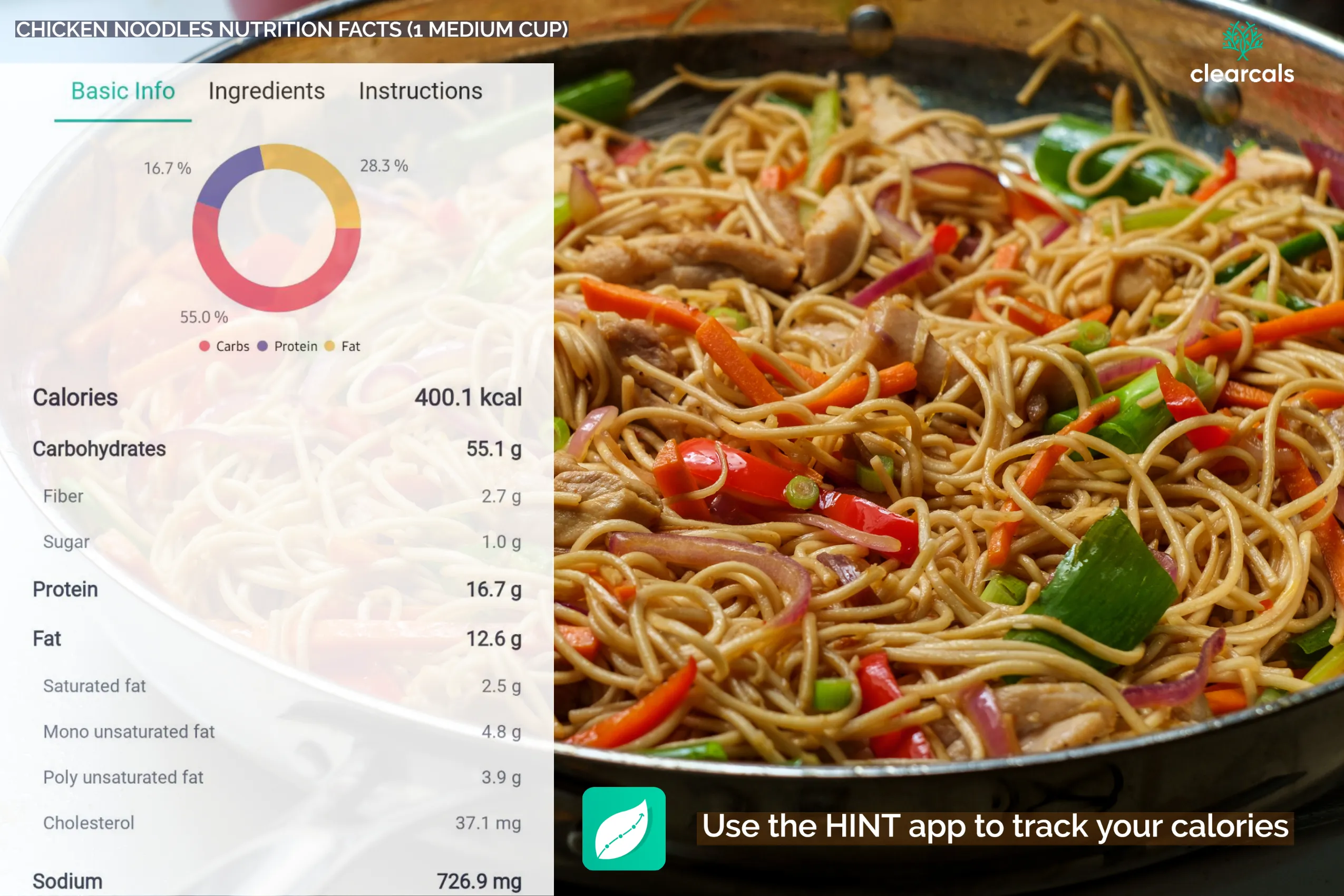
3. Chicken noodles
One medium cup of chicken noodles has 400 kcal. It contains 55% carbohydrates, 17% protein, and 28% fat. Chicken noodles are a good source of phosphorus, vitamin B6, vitamin D, alpha-carotene, and an excellent source of protein, niacin, beta-carotene, selenium, and vitamin E. Eat them in moderation as they contain too many calories, high sodium, and fat.
The calories in chicken noodles depend on their serving size or quantity in grams. Here is a table of how calories increase with quantity.
| Quantity (In Grams) | Chicken noodles Calories (kcal) |
|---|---|
| 1 Small cup (100 grams) | 200 |
| 1 Medium cup (200 grams) | 400 |
| 1 Large cup (300 grams) | 600 |
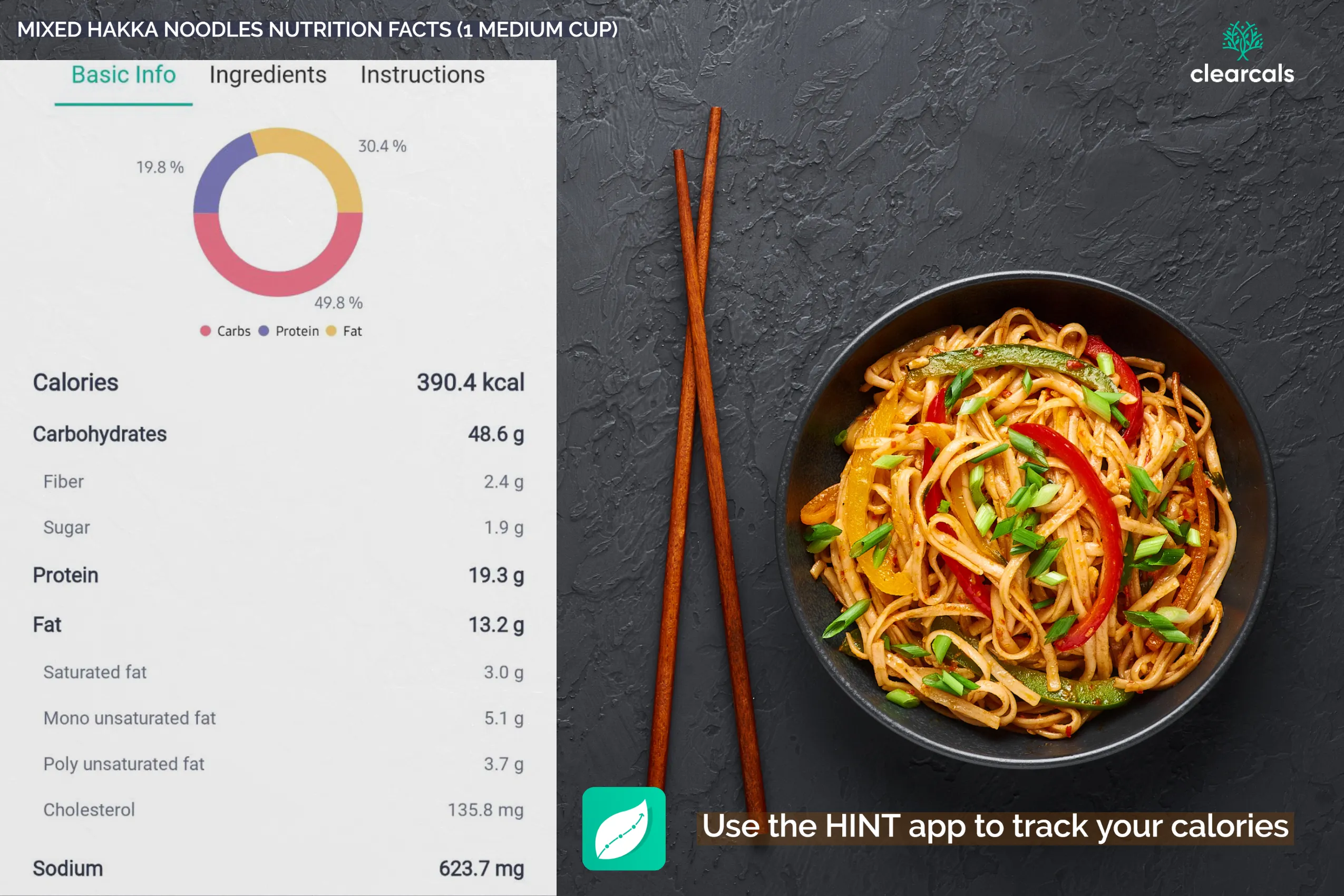
4. Hakka noodles
One medium cup of Hakka noodles has 390 kcal. It contains 50% carbohydrates, 20% protein, and 30% fat. Mixed Hakka noodles are a good source of vitamin D, thiamin, niacin, vitamin B6, phosphorus, magnesium, and manganese, and an excellent source of protein, beta carotene, selenium, biotin, vitamin C, and vitamin E. Eat it in moderation as it is high in simple starches, saturated fat, and sodium.
The calories in Hakka noodles depend on their serving size or quantity in grams. Here is a table of how calories increase with quantity.
| Quantity (In Grams) | Hakka noodles Calories (kcal) |
|---|---|
| 1 Small cup (100 grams) | 195 |
| 1 Medium cup (200 grams) | 390 |
| 1 Large cup (300 grams) | 586 |

5. Veg noodles
One medium cup of veg noodles has 381 kcal. It contains 64% carbohydrates, 9% protein, and 27% fat. Vegetable noodles are a good source of potassium, fiber, magnesium, manganese, vitamin B6, biotin, vitamin K, alpha-carotene, and an excellent source of protein, beta-carotene, vitamin C, vitamin D, and vitamin E. Eat it in moderation as it is high in simple starches, saturated fat, and sodium.
The calories in veg noodles depend on their serving size or quantity in grams. Here is a table of how calories increase with quantity.
| Quantity (In Grams) | Veg noodles Calories (kcal) |
|---|---|
| 1 Small cup (100 grams) | 190 |
| 1 Medium cup (200 grams) | 381 |
| 1 Large cup (300 grams) | 572 |
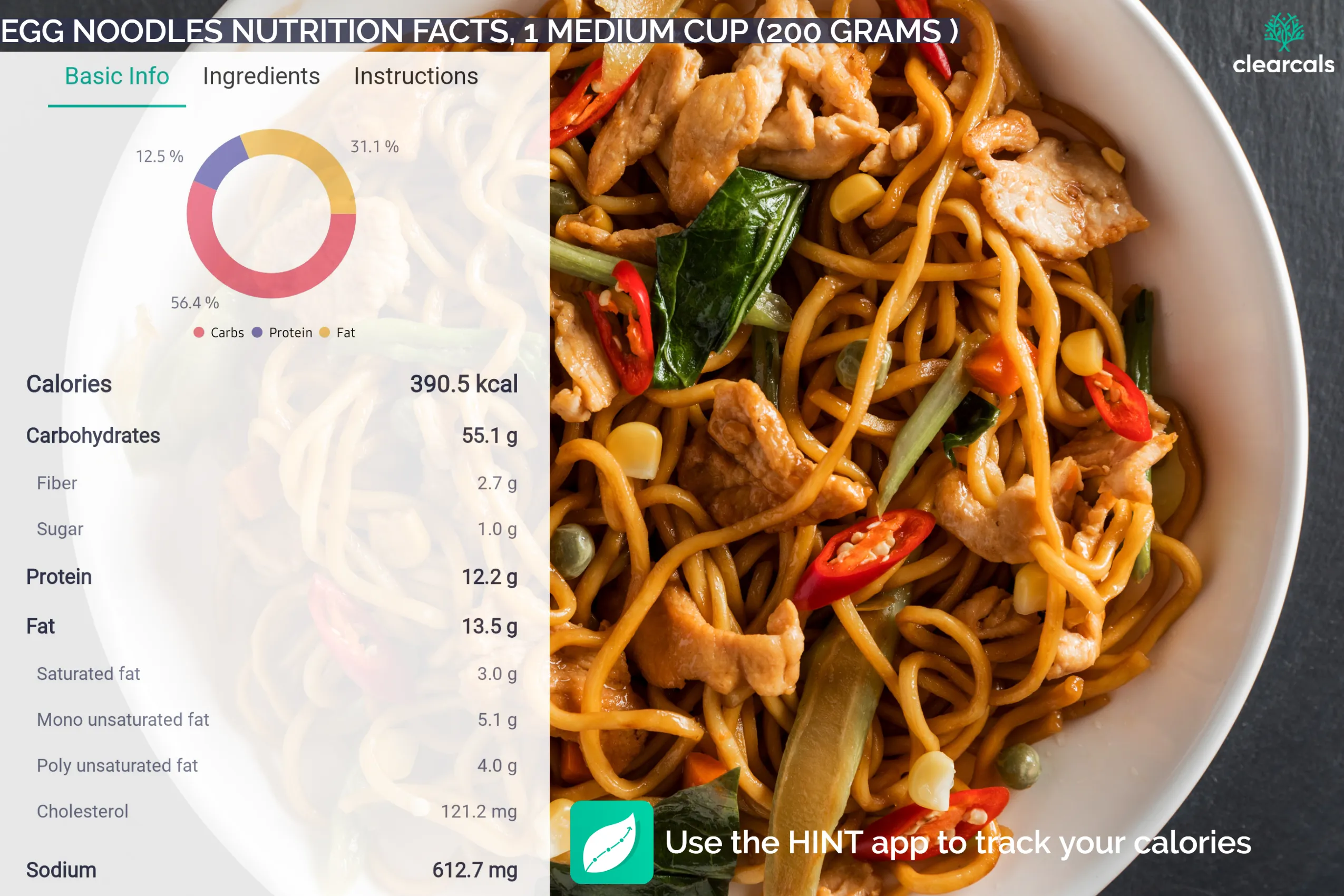
6. Egg noodles
One medium cup of egg noodles has 391 kcal. It contains 56% carbohydrates, 13% protein, and 31% fat. Egg noodles are a good source of vitamin B5, vitamin D, alpha-carotene, and an excellent source of protein, selenium, biotin, beta carotene, vitamin C, and vitamin E. Eat noodles in moderation as they contain too many calories, high sodium, and fat.
The calories in egg noodles depend on their serving size or quantity in grams. Here is a table of how calories increase with quantity.
| Quantity (In Grams) | Egg noodles Calories (kcal) |
|---|---|
| 1 Small cup (100 grams) | 195 |
| 1 Medium cup (200 grams) | 391 |
| 1 Large cup (300 grams) | 586 |
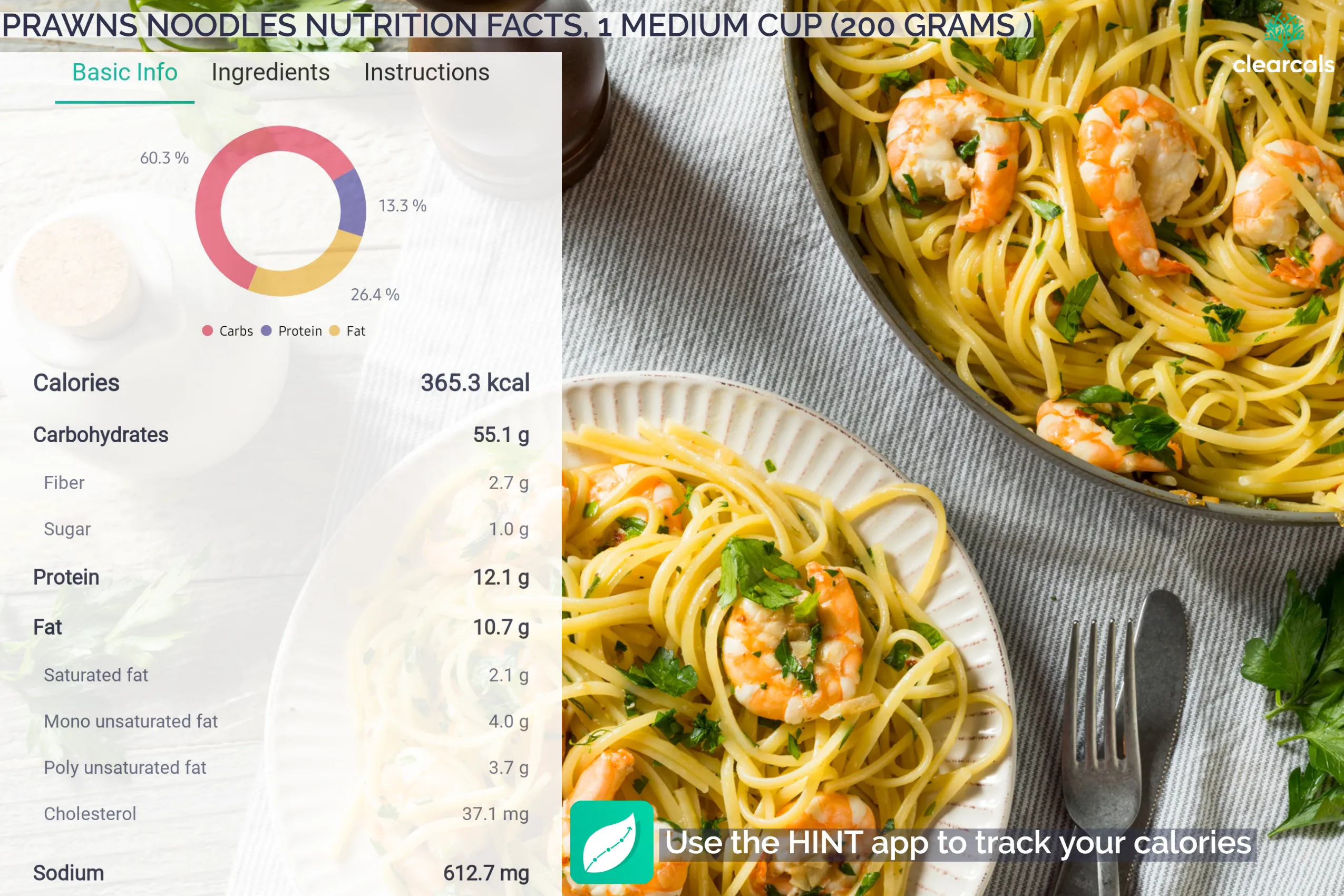
7. Prawn noodles
One medium cup of prawn noodles has 365 kcal. It contains 60% carbohydrates, 13% protein, and 27% fat. Prawn noodles are a good source of vitamin B5, selenium, biotin, vitamin D, alpha-carotene, and an excellent source of protein, beta-carotene, vitamin B6, vitamin C, and vitamin E. Eat noodles in moderation as they contain too many calories, high sodium, and fat.
The calories in prawn noodles depend on their serving size or quantity in grams. Here is a table of how calories increase with quantity.
| Quantity (In Grams) | Prawns noodles Calories (kcal) |
|---|---|
| 1 Small cup (100 grams) | 183 |
| 1 Medium cup (200 grams) | 365 |
| 1 Large cup (300 grams) | 548 |
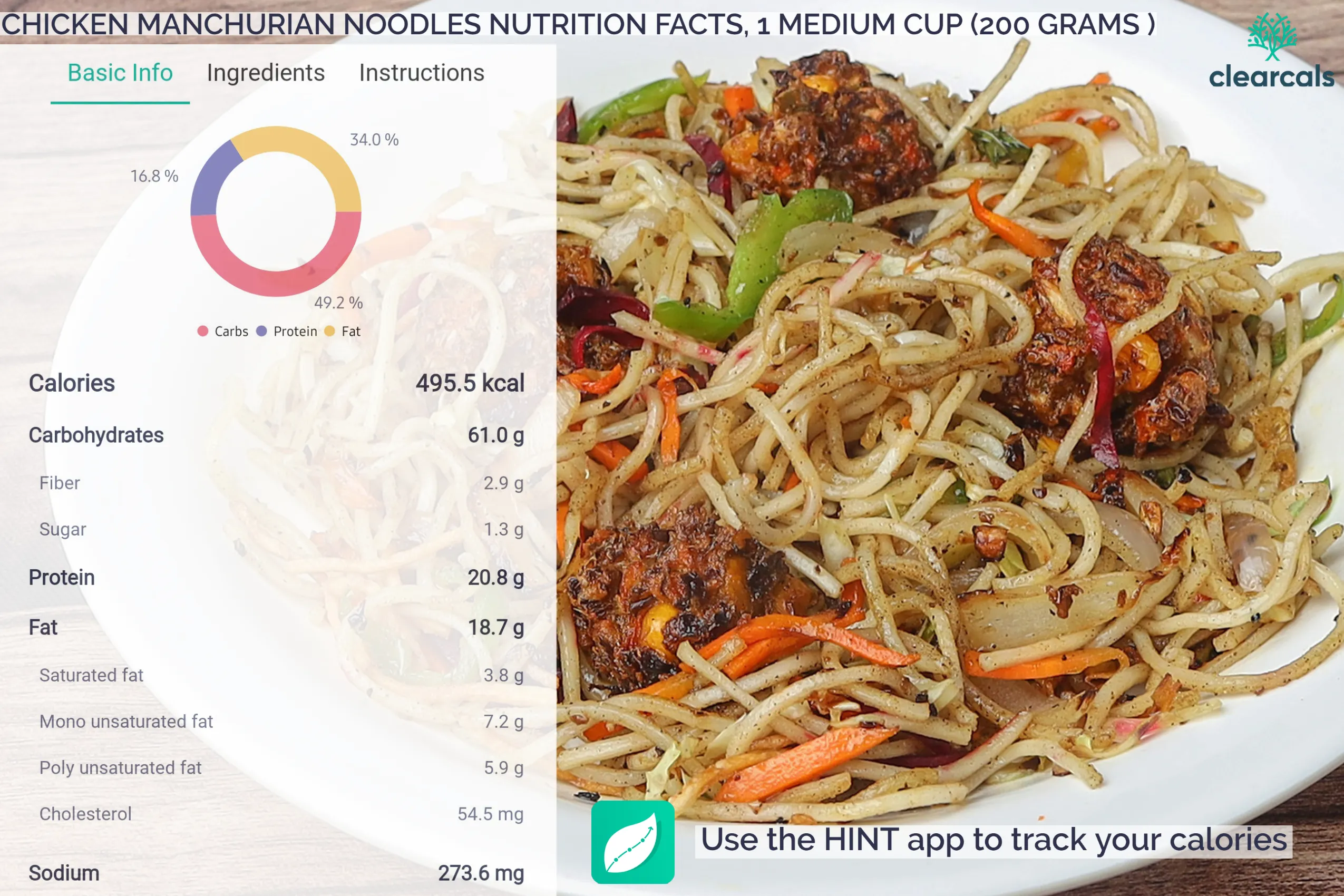
8. Chicken Manchurian noodles
One medium cup of chicken manchurian noodles has 496 kcal. It contains 49% carbohydrates, 17% protein, and 34% fat. Chicken Manchurian noodles are a good source of dietary fiber, vitamin D, thiamin, vitamin B6, phosphorus, magnesium, and manganese, and an excellent source of protein, niacin, selenium, vitamin C, and vitamin E. Eat noodles in moderation as they contain too many calories, high sodium, and fat.
The calories in chicken manchurian noodles depend on their serving size or quantity in grams. Here is a table of how calories increase with quantity.
| Quantity (In Grams) | Chicken Manchurian noodles Calories (kcal) |
|---|---|
| 1 Small cup (100 grams) | 248 |
| 1 Medium cup (200 grams) | 496 |
| 1 Large cup (300 grams) | 743 |
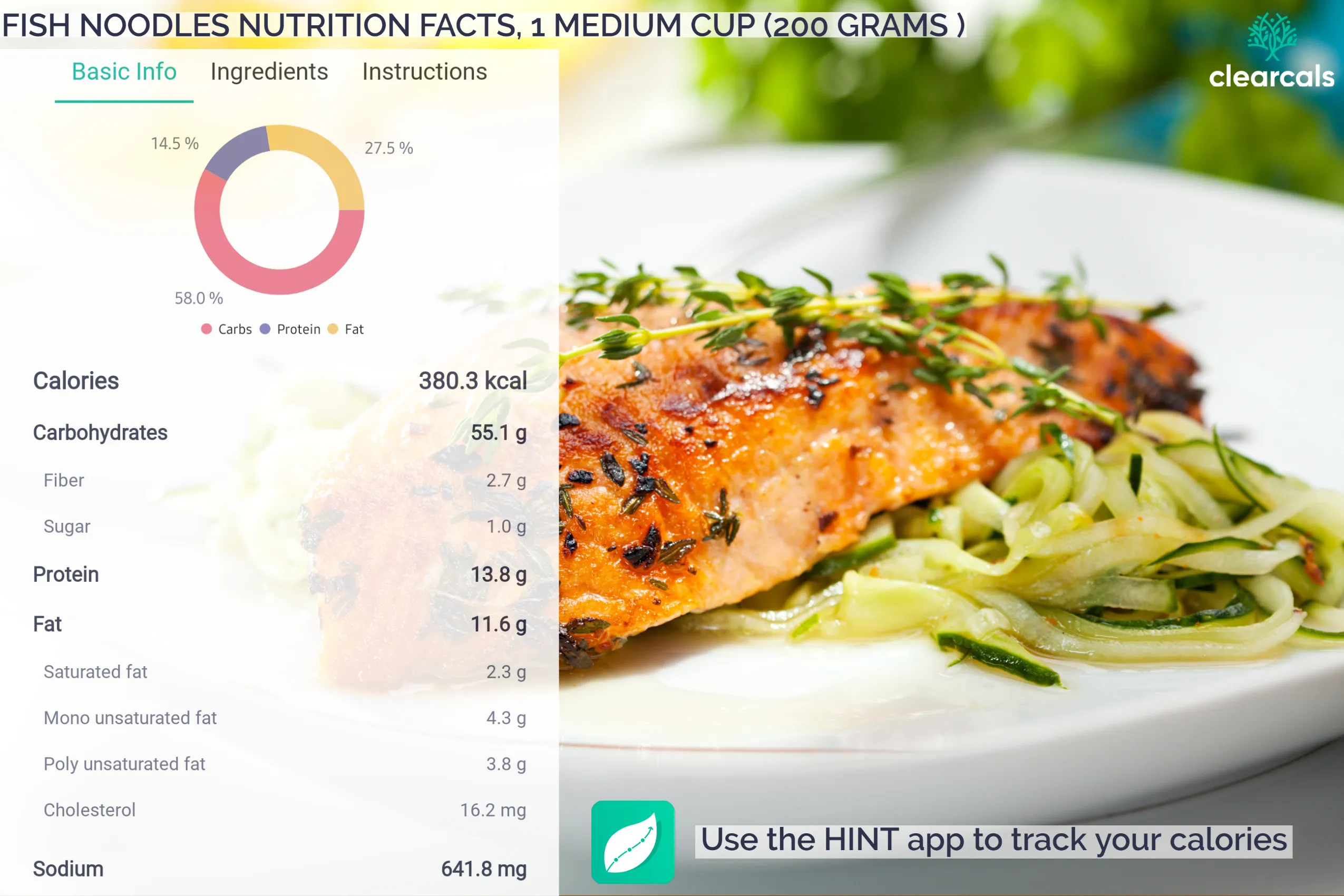
9. Fish noodles
One medium cup of fish noodles has 380 kcal. It contains 58% carbohydrates, 14% protein, and 28% fat. Fish noodles are a good source of phosphorus, vitamin B5, alpha-carotene, and vitamin D, and an excellent source of protein, selenium, biotin, beta-carotene, vitamin C, and vitamin E Eat noodles in moderation as they contain too many calories, high sodium, and fat.
The calories in fish noodles depend on their serving size or quantity in grams. Here is a table of how calories increase with quantity.
| Quantity (In Grams) | Fish noodles Calories (kcal) |
|---|---|
| 1 Small cup (100 grams) | 190 |
| 1 Medium cup (200 grams) | 380 |
| 1 Large cup (300 grams) | 570 |
Final Thoughts
Maggi, while convenient, should be eaten in moderation due to its high sodium, saturated fat, and refined carbohydrate content. Frequent consumption can contribute to health issues like high blood pressure, weight gain, and impaired immunity.
If you're working toward weight loss, managing chronic conditions, or simply aiming to improve your overall health, it’s important to reduce processed foods like Maggi.
The Hint app offers a comprehensive solution with personalized meal plans, calorie tracking, and access to nutritious recipes.
By subscribing to Hint Pro, you can unlock advanced features, while Hint Premium provides access to dietitians who can help tailor your diet to your health needs.
For healthier eating habits and better nutritional guidance, download the Hint app today and take the first step towards a balanced, healthier lifestyle.
Exclusive Offer: Enjoy One Month of Free Hint Premium Access
When you purchase any of the select Garmin Watches from the Clearcals Store, you'll receive one month of free Hint Premium (worth Rs. 1999), which includes:
✅ Unlimited dietitian consultations
✅ Personalized diet and workout plans
✅ Advanced calorie and nutrition tracking
🚀 Visit the Clearcals Store today and unlock your free Hint Premium access!
About the Author
Asfia Fatima is the Chief Dietitian at Clearcals, with a Master’s Degree in Dietetics and Clinical Nutrition and over a decade of experience in clinical nutrition and lifestyle management.
She specializes in evidence-based diet planning for weight loss, diabetes, and metabolic health.
At Clearcals, she leads the nutrition strategy behind the Hint app, helping users achieve their goals with science-backed guidance.
🔗 Connect with Asfia on LinkedIn






